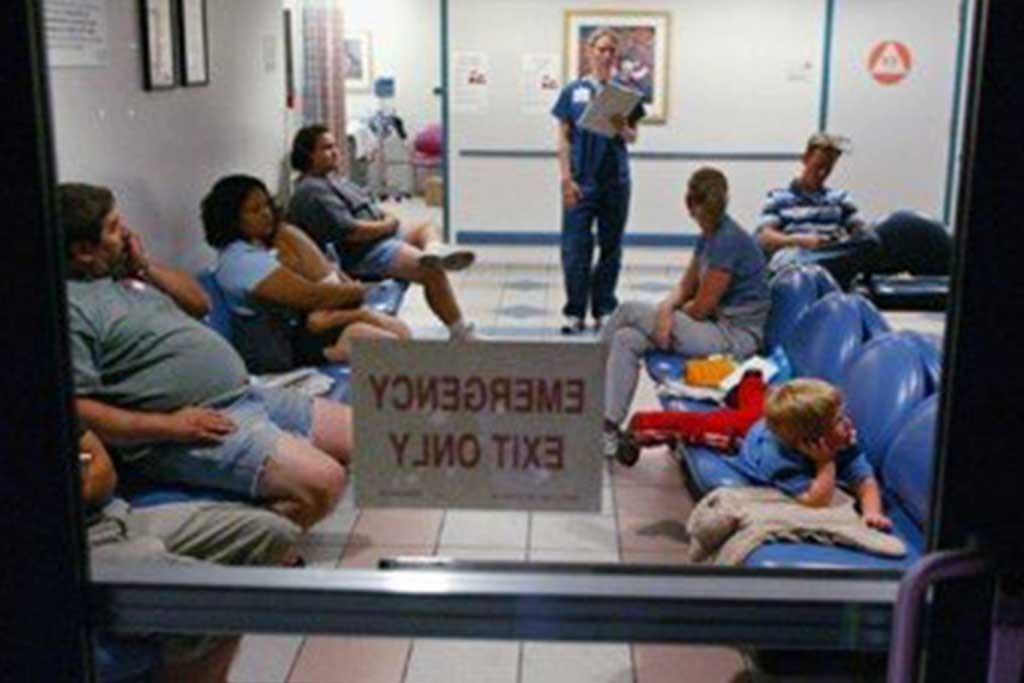Emergency rooms are understaffed and overcrowded. There are true emergencies indeed. Unfortunately far too many people go for the wrong reasons. The sniffles are not a reason to go to an emergency room. It’s not someplace you want to be unless you absolutely need to be there. Here’s what you should know before you go.
Emergency rooms are understaffed and overcrowded. There are true emergencies indeed. Unfortunately far too many people go for the wrong reasons. The sniffles are not a reason to go to an emergency room. It’s not someplace you want to be unless you absolutely need to be there. Here’s what you should know before you go. Go to the emergency room if you or someone with you experiences:
– Loss of consciousness
– Chest or severe abdominal pain
– Sudden weakness or numbness in face, arm, or leg
– Sudden changes in vision
– Difficulty speaking
– Severe shortness of breath
– Bleeding that doesn’t stop after ten minutes of direct pressure
– Any sudden, severe pain
– Major injury, such as a head trauma
– Unexplained confusion or disorientation
– Severe or persistent vomiting or diarrhea
– Coughing or vomiting blood
– A severe or worsening reaction to an insect bite, food, or medication
– Suicidal feelings
Don’t take a visit to the ER lightly. Why? There’s a lot that you might NOT want to know or hear about emergency rooms. Problems are rampant under ‘normal’ hospital circumstances. Imagine ‘amping’ all of those up in an ER scenario.
Germs Everywhere! If you’re worried about catching something from the person sneezing next to you in the waiting room, just imagine the germs surrounding the doctor or nurse treating you, say health experts. Health-care workers who don’t wash their hands are putting their patients at risk for all sorts of things including urinary tract infections, pneumonia, and blood infections, among other serious complications, doctors say. In the ER it’s even more prevalent because of pace. There’s simply more opportunity to forget to wash.
Accurate Information Accurate record keeping in hospitals is sub-par. It’s one of the aspects of our clients’ medical malpractice cases that we contend with frequently. Compliance for timely, accurate, complete data entry is low at best. Now translate that to the ER where staffing and overcrowding is even more severe. There’s a much greater chance doctors using computers to order prescriptions might easily order medication for the wrong patient or enter medical information under the wrong name, says Heather Farley, assistant chair of the department of emergency medicine for the Christiana Care Health System, a network of hospitals based in Delaware, and the lead author of a 2013 report on the quality and safety implications of emergency-department information systems. The risk is greater in fast-paced emergency rooms where doctors are juggling multiple critically ill patients who they’re often meeting for the first time.
Overbilling Being in the know every step of the way with your regular doctor is highly advised. This is never more true than with emergency room care where the doctors and staff don’t know you and you don’t know them. Being in the know is to your advantage in more ways than one, especially when it comes to your bill.
Emergency rooms often need to charge higher rates because they must be open 24/7, serve riskier patients and have higher overhead and staffing costs. It’s no surprise that a visit to the emergency room isn’t cheap, but bills are often inflated by tests and procedures that aren’t really needed.
Be proactive. Make sure everything is itemized and be in the know on every test being conducted and why. Be prepared that some of these charges can even be negotiated and dropped upon billing. About eight in 10 medical bills contain errors, estimates Pat Palmer, founder of Medical Billing Advocates of America, a group that helps patients lower their medical bills. Emergency rooms often charge a premium for routine medical supplies like Tylenol, gloves and bandages. There could be a clinic or urgent-care center down the street that’s better equipped to treat your condition, meaning shorter wait times and a smaller bill.
Don’t expect a lot of answers More than 60% of ER patients are referred to an outside physician or clinic for further treatment, according to a 2010 report by the CDC. Emergency room doctors work around the clock, but they don’t always have the expertise to treat patients with unique conditions—such as complicated brain injuries, serious burns, or rare heart conditions.
Do you have a plan? Being prepared is something we tell all our clients regardless of the circumstances. Do you have someone to go with you to the ER or meet you there? This person can help serve as your Advocate and give you the added support you’ll need during the ER
Check the heart attack and pneumonia success rates of the ERs near you at hospitalcompare.hhs.gov. If you’re in a position to choose your ER care, you’ll know in advance your best option for the best help you can get. Make sure your Advocate knows which ER you prefer as well.
- Make a list and carry it with you at all times: your doctors’ names and phone numbers, medications you take, food and drug allergies, a short medical history, phone number of a relative or friend (your Advocate) to call in an emergency (you can find a form online atmedIDs.com).
- Enter your emergency contact into your cell phone too.
- Make sure your house number is clearly visible from the street. If and when you need an ambulance, the faster EMTs can find you, the faster they can help you.
You can also download the Stanley Law Accident App which guides you through many steps that you or someone with you can implement should an accident happen.
What if something goes wrong? Things can and do go wrong in hospitals. It’s sometimes scary how often this is true and at Stanley Law we see it all the time. So again, if that’s the case for hospitals, the chance for medical negligence in the faster paced environment of the ER, is even greater. If you or your loved one are unduly harmed while in the emergency room or any hospital, you’re going to need good insight on what to do next. Medical malpractice is an area of law the Team at Stanley Law understands deeply. We understand what’s at stake and the seriousness of your circumstances. As with any accident or injury, timely action is critical and you’re going to need someone who understands medical malpractice, is on your side, and who’ll leave no stone unturned.
Joe Stanley of Stanley Law and his entire team have decades of experience in medical malpractice and have been working on behalf of clients across New York and Pennsylvania to help them get what they deserve. Medical malpractice is not a situation you want to go it alone on. If you or someone you love is a victim of what you believe is medical malpractice, please call us at 1-800-608-3333 or email us through our website where you can also describe your potential case. Your consultation is FREE.














